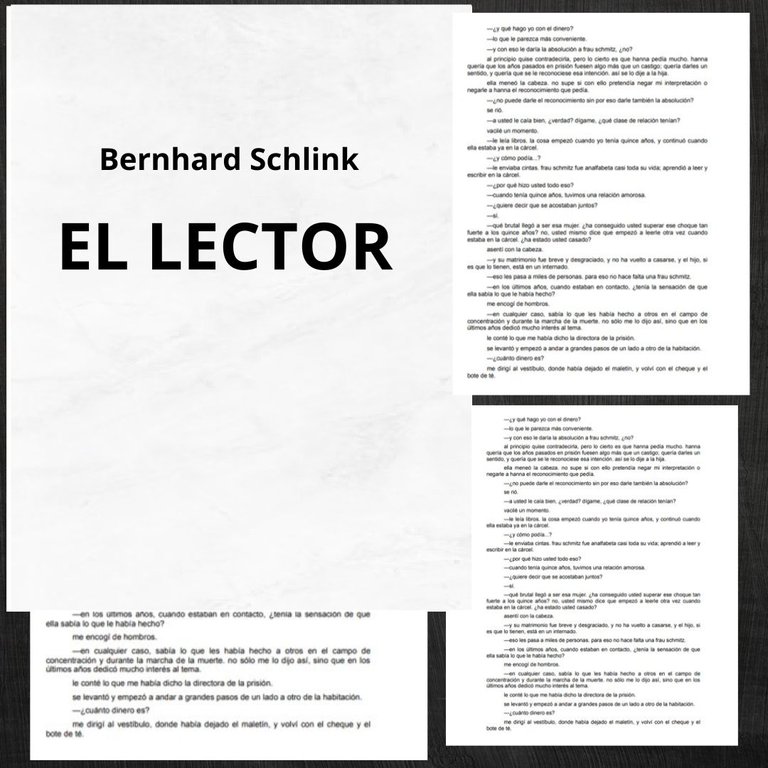
El lector, de Bernhard Schlink
Una novela escrita en tres partes, corta, de ciento doce páginas, donde no leerás los crímenes del holocausto nazi, aunque sea ese el tema de la misma. Por otra parte es una novela con un ritmo lento, el escritor va narrando los hechos que se van acentuando a medida que avanzamos en la trama, conduciéndonos con el protagonista, el Lector, a través de las profundidades de su propia mente.
No es una novela psicológica, pero las interrogantes, reflexiones y situaciones en las que se ve obligado a pensar el Lector para poder entender a la chica después de conocerla, mientras fue su amante, durante el proceso judicial y más tarde cuando la condenan, le dan una profundidad a la trama y he allí el enganche con el espectador.
Poco antes del final empezamos a preguntarnos ¿por qué la chica decide asumir toda la culpa cuando la acusación es para el grupo, cuando debería ser repartida? nos cuesta entender que la mujer se exponga a pasar el resto de su vida en prisión, que aparente no tener el más mínimo afecto por la libertad. Pero luego descubrimos sus verdaderas razones y en lo particular, por considerarme un lector constante y un amante del saber, me pregunto si su decisión, digna de estudiar, pudiera ser posible en la realidad.
No quiero dejarlos con la intriga para que busquen la novela y la lean; sólo les referiré que la mujer era analfabeta, pero ante el jurado, los jueces y el público en general, hace creer que sabe leer y escribir y lo hace para no pasar por la vergüenza del analfabetismo. Es un gesto de orgullo que le cuesta nada más y nada menos que su libertad, pero es un punto trascendental en la obra porque ahí se centra el núcleo de un conflicto interno por parte del personaje con el que uno se identifica por la determinación con que lo sostiene.
No tardarán mucho leyendo esta obra y estoy seguro de que al terminarla quedarán pensativos, como en mi caso, porque hay toda una situación hipotética, pero que como está bien argumentada trasciende la realidad de nuestros pensamientos y no deja de intrigarnos la idea de la cantidad de analfabetas que siéndolo son fácilmente manipulables, pero también el caso de la chica, que siéndolo, lo esconde para no sentirse avergonzada, aunque eso le cueste, repito la libertad y al final termine suicidándose.

The Reader, by Bernhard Schlink
A novel written in three parts, short, one hundred and twelve pages, where you will not read the crimes of the Nazi holocaust, although that is the theme of it. On the other hand it is a novel with a slow pace, the writer narrates the facts that are accentuated as we advance in the plot, leading us with the protagonist, the Reader, through the depths of his own mind.
It is not a psychological novel, but the questions, reflections and situations that the Reader is forced to think about in order to understand the girl after meeting her, while she was his lover, during the judicial process and later when she is convicted, give depth to the plot and therein lies the hook with the viewer.
Shortly before the end we begin to wonder why the girl decides to take all the blame when the accusation is for the group, when it should be distributed, we find it hard to understand that the woman is exposed to spend the rest of her life in prison, that she seems not to have the slightest affection for freedom. But then we discover her real reasons, and in particular, considering myself a constant reader and a lover of knowledge, I wonder if her decision, worthy of study, could be possible in reality.
I do not want to leave you with the intrigue to look for the novel and read it; I will only tell you that the woman was illiterate, but before the jury, the judges and the public in general, she makes believe that she knows how to read and write and she does it to avoid the shame of illiteracy. It is a gesture of pride that costs her nothing more and nothing less than her freedom, but it is a transcendental point in the play because that is the core of an internal conflict on the part of the character with whom one identifies because of the determination with which she sustains it.
It won't take you long to read this work and I'm sure that when you finish it you will remain thoughtful, as in my case, because there is a whole hypothetical situation, but as well argued transcends the reality of our thoughts and does not cease to intrigue us the idea of the number of illiterate people who being so are easily manipulated, but also the case of the girl, who being so, hides it to not feel shame, although it costs her, her freedom and in the end ends up committing suicide.

Portadas diseñadas en Canva. Fotografía tomada al pdf del libro



